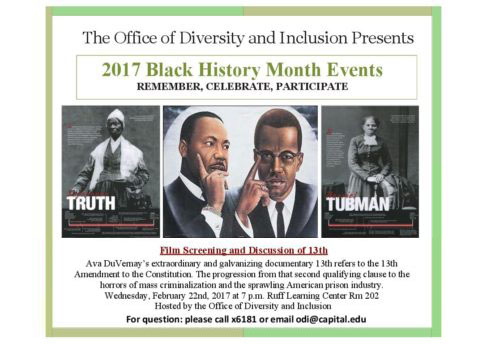From the time we’ve been in grade school, we’ve been made aware of Black History Month. Names like Rosa Parks, Dr. Martin Luther King and Booker T. Washington are praised and admired for what they have done for black lives in the United States. While these events are important to the advancement of black culture in the past, many are looking to broaden how Black History Month and black culture can be celebrated today.
The Office of Diversity and Inclusion (ODI) has compiled several different events over the month of February that focus on the history of black culture in the United States.
These events have included a viewing of “Mekonen: Journey of an African Jew,” hosted in collaboration with the Jewish Student Association; a soul food sampling and a trip to the Underground Railroad Museum.
This museum trip offered insight on the issue of slavery in the United States and made many of those who went think about how long it took for anti-discriminatory laws to be put in place.
“People continue to push issues back because they think slavery ended over 100 years ago,” student Rachael Love said. “Just because slavery ended doesn’t mean that us being confined by this government has stopped.”
Still to come are a lecture on how black music of the 20th century affected the civil rights movement and a viewing of the film “13th,” which details the 13th constitutional amendment and its eventual effect on mass criminalization and the growing prison industry.
Students feel that Black History Month goes hand in hand with issues like Black Lives Matter and find that it is met with some trace of backlash as it tries to assert that black rights are still a continual issue.
“It’s kind of like here with the ODI. I hardly ever see anyone in here that doesn’t look like me,” student Sarah Buckley said. “They think they’re going to be marginalized or excluded in here and that’s not true. It’s the Office of Diversity and Inclusion.”
Black History Month is often just assumed to be about the enslavement of African Americans and the hardships they have gone through in history.
“I never heard anything positive or uplifting about black people in history class,” student Dayzia Colflesh said. “It was all about enslavement.”
Depending on a student’s background, sometimes this is all people may know about black history. Dr. Eva George, who teaches African American History and Culture on campus, believes that Black History Month should be about both the struggles and triumphs of black culture.
“It’s to empower us,” Love said. “Like that movie ‘Hidden Figures,’ it shows that we have all of these talents, but we didn’t get to be the face of it because we were black.”
Black culture is continually changing. “I’ve only seen black culture become stronger, but I’ve also seen it become more mainstream–and that can be good and bad,” says Dr. Eva George.
Black culture has become more mainstream in terms of appropriation; Kylie Jenner has sported dreadlocks on her Instagram account, Miley Cyrus infamously twerked onstage in her Video Music Awards performance, and many other celebrities have appropriated trends from the black community.
“I know appropriation happens. It’s about publicity and it’s easy for an artist who is not black to take on a black identity in the limelight,” said George.
While Black History Month is important, it can often promote consumerism. People don’t necessarily show up to events to appreciate the culture and the people–they come for the food or celebration it offers. As many have suggested before, society often shows more appreciation for black culture than they do black people.
Black History Month is just for black people and excludes all other groups. Throughout history, people of all different ethnicities have helped advance the civil rights movement, and their celebration and validation of black culture is extremely important.
Ultimately, Black History Month is a time to embrace black culture in all aspects. While the struggles may be hard to discuss, there is still joy and triumph that comes out of the protest and resistance to oppression. “We shouldn’t depend on Black History Month to educate people,” said George. “You need a lot more than just one month.”
This is a chance to learn more about people you may not know much about. The culture will continually change but will still represent a long important history.

